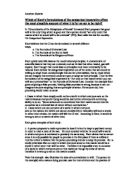The ability to act freely means that humans are able to act without constraints of determinism or necessity, therefore human action is decided upon by reason. For an action to be rational, however, it is important to note that it (reason) must motivate our actions, as well as justify them. This is because without rationality in the decision making process it would be impossible to say that the consequential action was a rational one. Again, this creates a problem because it is difficult to argue that a motivation is rational and not one done due to emotion or passion because rationality is based on judgments about the world and inferences from this. For example, if I feel very strongly about human rights issues then it would be my feelings of passion that would prompt me to campaign for freedom of speech in Burma rather than rationality that tells me what to do.
This is where the idea of the imperative comes in. Instead of describing the world and making judgments about it, the imperative can be used as a guide to action. This imperative is free from emotional guidance or motivation and addresses itself to the agent directly. Therefore reason is supposedly able to determine the will and emotions are not necessarily a part of the decision making process.
Although Kant discussed hypothetical imperatives, as well as categorical imperatives, the main distinction between the two is that the hypothetical imperative is based on conditionality, i.e. it is not something that is relevant to all, but is relevant only to the person who is carrying out the action. Therefore, Kant argues, such imperatives are conditional to the agent’s (person who is doing the action) desires and this does not correspond to the true command of reason.
Categorical imperatives are different because these apply universally and tell people what to do unconditionally. For example, if someone tells me that they will buy me dinner if I give them a lift into town, then this is a conditional action and would fall into the hypothetical imperative category. Conversely, if I think that I should give my friend a lift into town with no other agenda (i.e. she will not buy me dinner because of it), then this is a categorical imperative because it is independent of my interest and could apply to other people as well as myself.
Universality is central to the categorical imperative, therefore, because it is reliant upon being applicable to and achievable by everyone. However, it is important to note that the categorical imperative is a law of reason based on different parts, rather than it being a straight forward single law. This “law” is derived in the following way; to be a motivation (imperative) of reason (and not emotion or passion) it is important that all desires, interests and ambitions must be removed. If everyone’s passions were to be removed then everyone would be at the same starting point, so to speak. There would be no distinction between persons with regard to motivations, i.e. they would all be based on reason. Kant believes that once the passions have been removed from the motivation of action then an intelligible decision can be made which would be uniform for all. Therefore, the rule that is formulated from this position of reason would be universal to all rational beings. Thus reason is constrained to acting only on a maxim that can also be willed as a universal law, because as a rational being, if I did not want others to act in some way, for example, to break promises, then I would not want to act in that way myself because my reason would tell me that it is something that I nor anyone else ought to do.
The categorical imperative, therefore, does not have a specific command, but it does act as an authority in the decision over whether or not actions are allowed. Kant’s main point in this idea about categorical imperatives being universal is that one should do as one would be done by. This he calls the Golden Rule and consists in the fact that based not on experience, but a priori, one must act according to reason, which will constitute in ends that respect the freedom of all. This is necessary so that our rational freedom can produce universal laws that are applicable to all equally. To not treat other rational beings with equal respect, i.e. to use them as a means and not to treat them as an end in themselves, would be to deny their autonomy and freedom. Therefore, not only must action be universally acceptable, but it must also be respectful on all rational agents and treat them not as a means to an end, but an end in themselves.
However, Kant also notes that talking about all people being treated as ends in themselves refers to an ideal world which is not a true reflection of the world in which we live and that we do actually act irrationally and without respect for each others autonomy and freedom.







